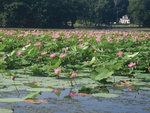By DANIEL KITTREDGE An invasive plant is causing issues at a Cranston pond, and state officials are calling on members of the community to help push back. The Rhode Island Department of Environmental Management last week announced it is recruiting
This item is available in full to subscribers.
We have recently launched a new and improved website. To continue reading, you will need to either log into your subscriber account, or purchase a new subscription.
If you are a current print subscriber, you can set up a free website account by clicking here.
Otherwise, click here to view your options for subscribing.
Please log in to continue |
|


An invasive plant is causing issues at a Cranston pond, and state officials are calling on members of the community to help push back.
The Rhode Island Department of Environmental Management last week announced it is recruiting volunteers to harvest seed ponds from a sacred lotus patch at Meshanticut Pond, with harvesting events to be scheduled later this month and in early August.
As of Friday, more than 140 volunteers had answered the call, according to the agency.
In a statement, RIDEM describes the sacred lotus – or Nelumbo nucifera, as it is known scientifically – as a “highly-aggressive, invasive species that threatens a healthy balance of native plants.” The presence of the lotus patch on the pond “impedes fishing and boating opportunities and will be costly to manage over the next several years,” the statement reads.
The presence of the sacred lotus at Meshanticut Pond is the first finding of the plant in a natural area of Rhode Island, according to RIDEM. It was first documented at the pond in 2018 and is believed to have been growing for roughly five years.
It is also only the second such finding in New England, after a single lake in Massachusetts. The sacred lotus is said to be typically found in “small, isolated, backyard water gardens or curated in pots at botanical gardens.”
RIDEM’s statement indicates it believes that an area resident unwittingly released the lotus into the pond without knowledge of its ability to rapidly spread. According to the agency, the patch now covers 1.25 acres of the 12-acre pond, “with its massive leaves covering large areas and outcompeting native aquatic vegetation.”
RIDEM describes the need to curb the spread of the lotus as “urgent” in order to prevent its spread to other areas of the state or the region.
“The rapid and aggressive dispersal of this lotus patch is a case study in the impacts of invasive plant species,” Katie DeGoosh-DiMarzio, an environmental analyst with RIDEM’s Office of Water Resources, said through the statement. “Its establishment and spread are degrading native habitat and decreasing recreational opportunities. We hope that civic-minded volunteers will join us and help check the spread of this destructive invasive plant.”
During the harvesting events – the dates of which have yet to be announced – volunteers will use their own canoes or kayaks. Sacred lotus seed pods will be cut from stems, and volunteers are also asked to bring pruning sheers and containers. Non-boating volunteers remaining ashore will unload the containers for disposal.
“Seed pods must be removed after the plants have flowered but before they drop the seeds in order to slow down plant regrowth,” RIDEM’s statement reads. “Lotus plants will reproduce by seed and root system, but removal of the seed pods will reduce the number of new plants and help eliminate opportunities for seeds to move downstream. Future control efforts may include use of chemical herbicides, but manually harvesting the seed pods this summer will reduce the amounts of herbicides necessary to treat the lotus patch.”
For more information or to register for one of the harvesting events, visit ri.gov/press/view/36302. RIDEM also provides updates via Twitter and Facebook (@RhodeIslandDEM).
Comments
No comments on this item Please log in to comment by clicking here